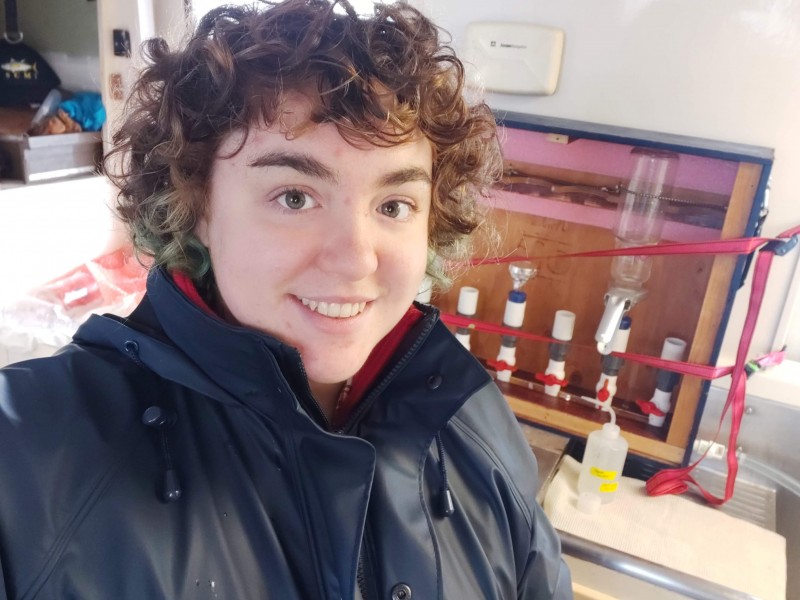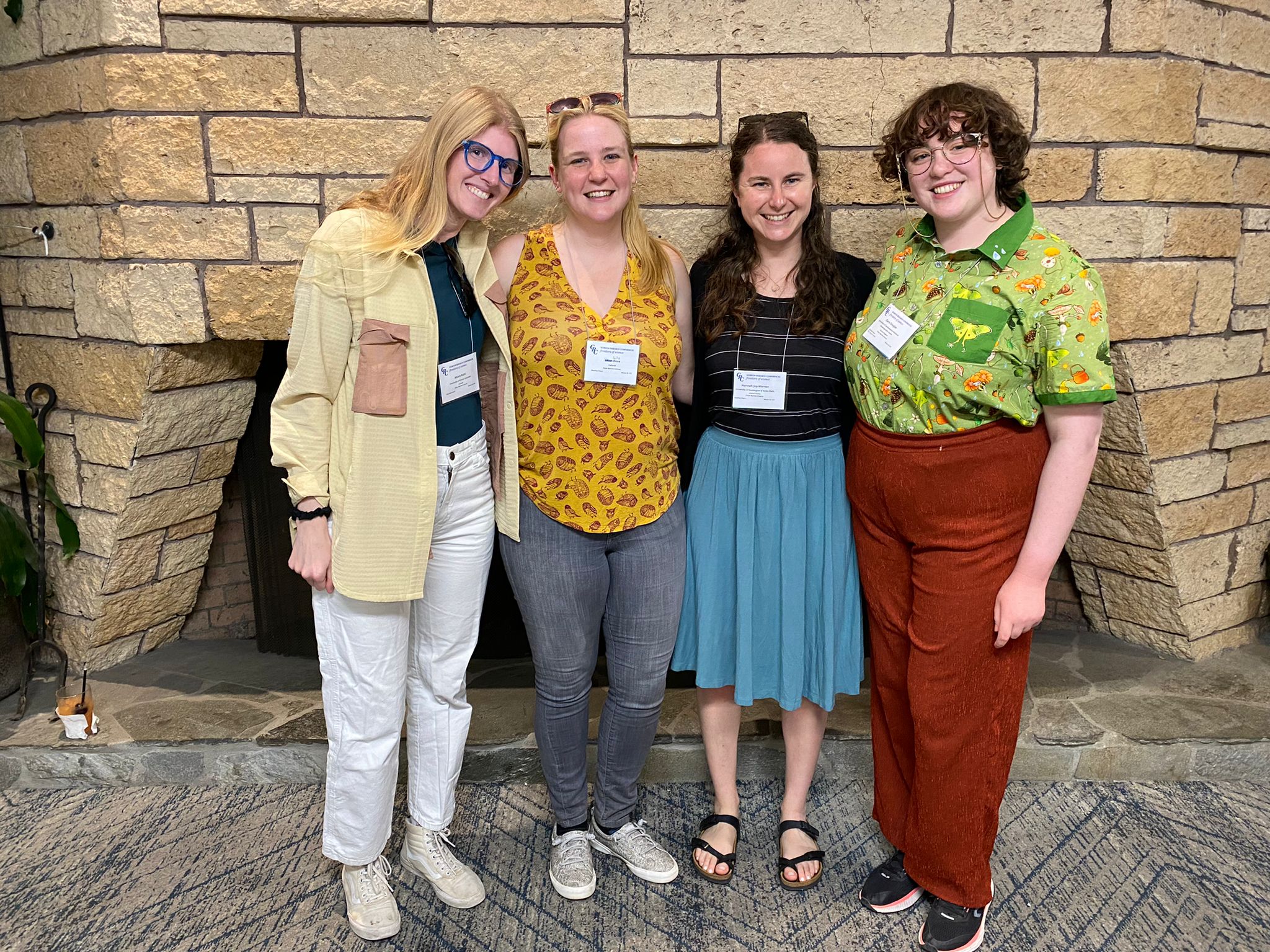A trip across the pond: Polar Marine Science and Lipidomics
Clara Celestine Douglas
National Oceanography Centre and University of Southampton

Caption: Clara in front of the filtering rig on board the R/V Yellowfin during a monthly SPOT research cruise.
Earlier this year, I travelled to California to carry out a three-month research placement at the University of California, Berkeley. While I was there, I was also able to attend the Polar Marine Science Gordon Research Seminar and Conference (GRS and GRC) in Ventura.
The Polar Marine Science GRC is a biennial conference that brings together scientists from across the world to share their research across a diverse range of topics in polar science: spanning social sciences, physical oceanography, biogeochemistry, and the implementation of marine protected areas. It is preceded by an early career researcher (ECR) seminar, for which I was asked a few weeks prior to give a talk in the first session. The prospect was somewhat nerve-wracking as it would be only the second time that I had presented a full-length 20-minute talk at a conference, but it provided an invaluable space to present my research to fellow PhD students and postdocs. I received encouraging feedback from my peers that boosted my confidence ahead of the main conference.
At the GRC, the presentations and wide-ranging conversations during the ‘power hours’ stimulated active discussion across the scientific community. The broad range of knowledge and backgrounds at the conference sparked interesting cross-discipline conversations and gave me a broader appreciation for the work be undertaken in the polar regions. I was delighted to have a lot of engagement at my poster and received thought-provoking insights and ideas for further research. The structure and size of the conference made it ideal for connecting with scientists across different career stages beyond the presentations and poster sessions, and I enjoyed the informal networking during the downtime. Having started my PhD in 2020, this GRC allowed me to meet fellow polar marine scientists in person, whom I had previously only met online. I was especially excited to connect with other ECRs and expand the reach of a network that had originated from the SOCCOM ECR community. This was my second time attending a GRS/GRC and I am honoured to have been voted to be one of the co-chairs of the next Polar Marine Science GRS!

Caption: Meeting (all-but-one of) the SOCCOM ECR organising team in person! Alexis Bahl, Lily Dove, Hannah Joy-Warren, Clara Douglas at the Polar Marine Science GRC in Ventura
Between February and May, I was based at UC Berkeley working within the Edwards Lab in the Earth and Planetary Science department. Professor Bethanie Edwards and her group study the lipids present in marine systems. Lipidomics is one branch of omic research that can be used to study complex microbial ecosystems. Different lipids have different functions, so samples can be analysed to determine a range of parameters, including metabolic processes and rates, taxonomy, changes in ecosystem states and biological stressors. Some better-known lipids include pigments (like chlorophyll), phospholipid bilayers in cell walls and oxylipins.
My research contributed to the Southern California Bight Lipidomic Time-series project being undertaken in the Edwards Lab. This project aims to enhance our understanding of biological processes and carbon cycling in this region. Lipid samples were collected throughout the water column at the San Pedro Ocean Time-series (SPOT) in 2019 and 2022. I had the opportunity to take part in two research cruises to the SPOT site during my placement. Lipid samples are collected by filtering water samples using a vacuum pump system on board the ship. The lipidome is then extracted from the filters using a Bligh and Dyer extraction method and subsequently analysed using ultra-high-performance lipid chromatography (UPLC), which separates lipid compounds based on their hydrophobicity. Mass spectrometry (MS) is then performed to measure the properties of lipids and identify lipids present in the sample. Whilst in Berkeley, in addition to extracting my 2023 samples, I analysed the UPLC-MS 2019 results to look for biomarkers of grazing, viral infection, bloom state, and community composition over the seasonal time-series.
I had a fantastic time working in the Edwards Lab – it is a small, close-knit group and it was fun joining a new project and experiencing how other research groups work. We frequently met for writing and brainstorming sessions. During a weekly class with undergraduates, we also had interactive discussions about assigned papers. I presented my PhD work to another class and at a lab group meeting, led an introductory tutorial on using satellite data.
These experiences were incredibly valuable for me, and I feel very lucky to have had these opportunities. I’d like to thank the Challenger Society for awarding me the travel award that contributed to my travel expenses, allowing me to attend the Polar Marine Science GRS and GRC and the research placement at UC Berkeley.
Profile:
I am a third year INSPIRE PhD student at the University of Southampton and the National Oceanography Centre. My research aims to better understand the Southern Ocean biological carbon pump using data from satellites and autonomous Biogeochemical-Argo floats, with a focus on the Weddell Sea. I have an MSc in Oceanography from the University of Southampton and a BSc in Marine Biology from the University of St Andrews.
Latest News
Royal Society Publishing Photography Competition 2025
Please see a message from the Royal Society below:
We are delighted to announce that the 2025 Competition is now open for entries until 15 August for a chance to win £1000! The competition celebrates the power of photography in conveying the wonder of science happening all around us and photographs can be submitted in the categories of: Astronomy, Behaviour, Earth Science and Climatology, Ecology and Environmental Science, and Microimaging.
The competition is free to enter and open to anyone studying or working in science at graduate level or above. Category winners will receive a one-year membership to the Royal Photographic Society and the overall winner will receive a grand prize of £1,000. Find out more: https://bit.ly/RSPphotocomp
October 2025 MEDIN Workshop: Marine Data Management, Governance and the MEDIN toolset
The Marine Environmental Data and Information Network (MEDIN) are pleased to announce that registration is now open for the next occurrence of our popular free online training workshop: ‘Marine Data Management, Governance and the MEDIN toolset’ on the 13th – 17th October 2025 on OceanTeacher Global Academy.
Marine Data Management, Governance and the MEDIN toolset
The Marine Environmental Data and Information Network (MEDIN) and OceanWise are delighted to invite you to attend our popular free online training workshop: ‘Marine Data Management, Governance and the MEDIN toolset’ on the 19th – 23rd of May 2025.
